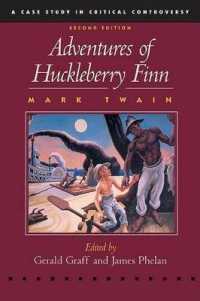- ホーム
- > 洋書
- > 英文書
- > Cinema / Film
Full Description
Academic philosophy may have lost its audience, but the traditional subjects of philosophy-love, death, justice, knowledge, and faith-remain as compelling as ever. To reach a new generation, Paul W. Kahn argues that philosophy must take up these fundamental concerns as we find them in contemporary culture. He demonstrates how this can be achieved through a turn to popular film. Discussing such well-known movies as Forrest Gump (1994), The American President (1995), The Matrix (1999), Memento (2000), The History of Violence (2005), Gran Torino (2008), The Dark Knight (2008), The Road (2009), and Avatar (2009), Kahn explores powerful archetypes and their hold on us. His inquiry proceeds in two parts. First, he uses film to explore the nature of action and interpretation, arguing that narrative is the critical concept for understanding both. Second, he explores the narratives of politics, family, and faith as they appear in popular films. Engaging with genres as diverse as romantic comedy, slasher film, and pornography, Kahn explores the social imaginary through which we create and maintain a meaningful world.
He finds in popular films a new setting for a philosophical inquiry into the timeless themes of sacrifice, innocence, rebirth, law, and love.
Contents
Preface Acknowledgments Part I: From Philosophy to Film 1. Philosophy, Democracy, and the Turn to Film 2. Freedom and Persuasion 3. On Interpretation Part II: Film and the Social Imaginary 4. Violence and the State 5. Love, Romance, and Pornography Conclusion: Film, Faith, and Love Notes Bibliography: Essays on Sources Index







